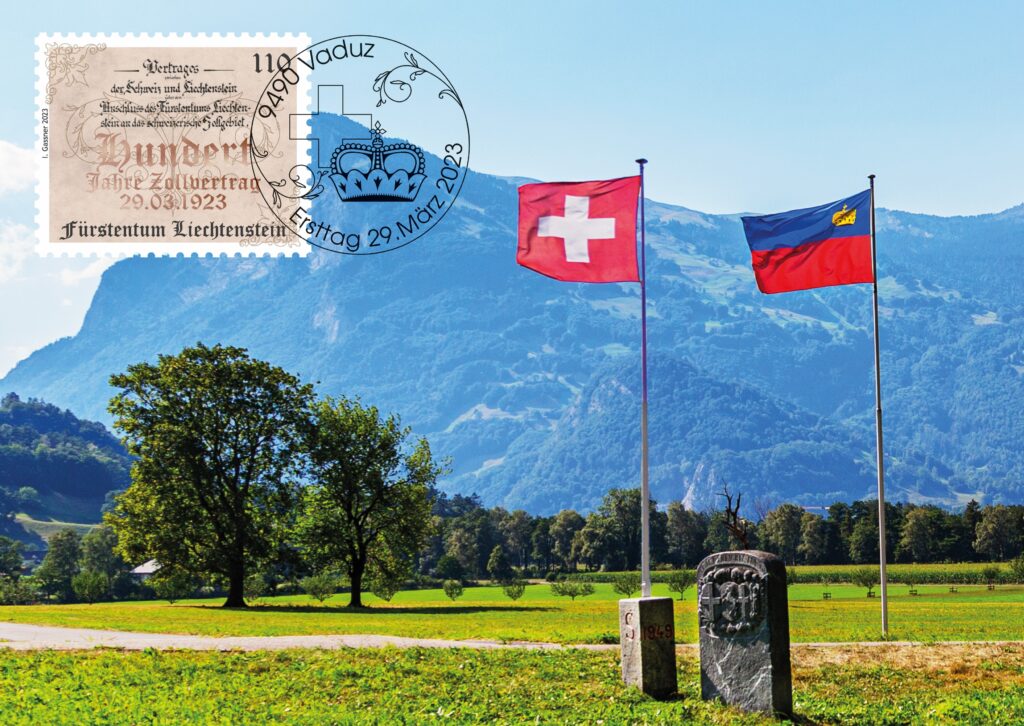100 Years of Switzerland-Liechtenstein Customs Treaty
On March 29, 1923, Liechtenstein and Switzerland signed the treaty to include the Principality of Liechtenstein into the Swiss customs territory, becoming a common economic space on January 1, 1924.

The Customs Treaty in Brief
The Switzerland-Liechtenstein Customs Treaty was signed on March 29, 1923. By entering into the same, Liechtenstein gave up part of its sovereignty: that is, all Swiss laws that were related to the same were to be taken over by Liechtenstein such as the fight against epidemics, the determination of public holidays or in the adoption of Swiss legislation on factories.
The adoption of Swiss law went and still goes far beyond the scope of customs duties in fact, with the customs treaty, Liechtenstein gave up its autonomy in foreign trade and authorized Switzerland to represent it in negotiations with third countries. Foreigners’ police border controls at the Rhine bridges were abolished, and Liechtenstein applies the Swiss Foreigners’ Police Act. With the entry into force of the Customs Treaty, Liechtenstein was integrated into the world economy through Swiss foreign trade policy. The opening of borders for raw materials, goods and people created favorable conditions for Liechtenstein’s rapid postwar economic recovery. Revenue from the flat-rate customs duty agreed with Switzerland also contributed significantly to Liechtenstein’s national budget in the interwar period. From 1924 to 1940, an average of about a quarter of state revenue came from the flat-rate customs duty. In 1951 there was a shift from the lump sum to a proportional calculation of the amount, which led to a new increase in Liechtenstein’s customs revenue in the following years.
In 1924 the legal basis was also created for the introduction of the Swiss franc in Liechtenstein, which was already used in daily life and since 1917 had been regarded as a parallel currency to the Austrian krone. Not only private individuals, but also the state had already switched to the Swiss franc before 1924, since, for example, from 1920 all public taxes to the state had to be paid in francs. From 1922 onward, national accounts were also presented only in francs, but, a currency treaty with Switzerland, which provided for the use of the Swiss franc in Liechtenstein on a contractual basis, was not on the table at the time of the entry into force of the customs treaty, and it was not until 1981 that such a treaty was concluded.
Over the past 100 years, the Customs Treaty has been one of the key factors in the positive development of Liechtenstein’s economy and is still an important locational advantage for domestic companies. On the basis of the Customs Treaty, Liechtenstein is obliged to adopt Swiss customs legislation; at the same time, all trade and customs treaties concluded by Switzerland with third countries have since then also applied to Liechtenstein. “The Customs Treaty created a solid foundation for relations between Liechtenstein and Switzerland, which today affect many areas of life and connect both countries,” said Deputy Prime Minister Sabine Monauni at the March 6, 2023 media orientation in Vaduz. To commemorate and honor this close bond with Switzerland, several events are planned in Liechtenstein and Switzerland this year, 100 years after the signing. “We have put together a varied program that does justice to the historical context, economic concerns, and most importantly, friendship with Switzerland,” says Councilor Dominique Hasler.
100-Jahre-Zollvertrag-Broschuere – Brochure 100 Years of Customs Treaty (in German)
Short clip 100 years of customs treaty
Official gala evening and celebration for the people
A gala evening for invited guests will be held at the SAL in Schaan on March 29, 2023. High-level representatives from Liechtenstein and Switzerland have been invited to celebrate the 100th anniversary together.
On April 29, 2023, the people of Liechtenstein and Switzerland will celebrate a cross-border celebration around the Old Rhine Bridge Vaduz-Sevelen starting at 11 a.m. In addition to the ceremonial entrance of the delegations from St. Gallen, Graubünden and Liechtenstein and various speeches, a varied program will take place on this day, including so-called economic and political roundtables. In addition, several works of art conceived jointly by Swiss and Liechtenstein artists will be displayed on the Old Rhine Bridge, testifying to the cultural union of the two countries.
Learn more about the history of the customs treaty
Since the beginning of the year, the Liechtenstein Institute and the Historical Society of the Principality of Liechtenstein have been organizing a four-part lecture series to mark the anniversary of the signing of the Customs Treaty. On March 6, 2023, the lecture “One Day We Will Be Swiss: The Contemporary Question of Liechtenstein’s National Identity Around the 1923 Customs Treaty” was held. The fourth and final lecture in the series is titled “100 Years of Customs Treaty – 100 Years of Relations” on March 20, 2023.
Excellent bilateral relations between Switzerland and Liechtenstein

Political exchange
The Parliament of Liechtenstein also wishes to honor the anniversary in a special way. For example, a special session on the Customs Treaty will be held on April 26, 2023. On June 6, 2023, the Liechtenstein Parliament will be received by the Swiss Parliament in the Federal Palace in Bern to honor the centenary of the Customs Treaty.
To conclude the anniversary celebrations, a conference for administrative staff related to the Customs Treaty will be held in Bern on June 15, 2023, ending in the evening with an aperitif for invited guests at the Hotel Bellevue.
Source: zollvertrag.li





